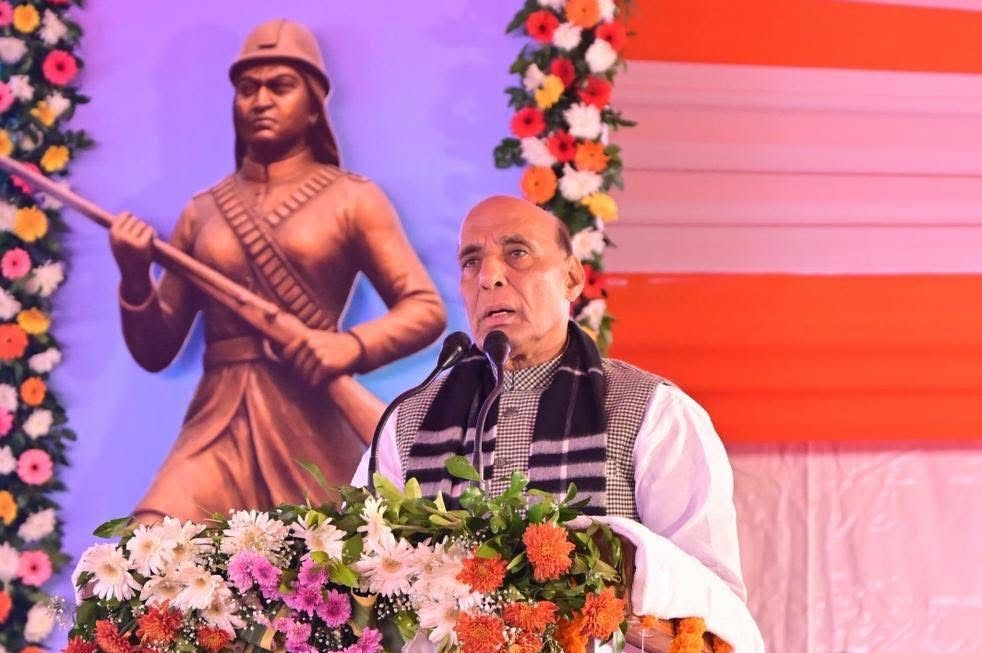
Uda Devi’s courage takes centre stage as Raksha Mantri calls her a guiding force for today’s soldiers
Honouring one of India’s boldest yet overlooked female freedom fighter, Raksha Mantri Shri Rajnath Singh paid a powerful tribute to Uda Devi in Lucknow, calling her courage a defining moment of the 1857 revolt and a strong symbol of Dalit women’s leadership. He said her fearless legacy still inspires India’s Armed Forces today, seen in the growing role of women soldiers and pilots who showed remarkable grit during Operation Sindoor.
“During Operation Sindoor, female pilots and female soldiers played a crucial role in counter-terrorism operations in Pakistan and Pakistan-occupied Jammu and Kashmir,” said Raksha Mantri Shri Rajnath Singh while praising the unprecedented rise of women in the Indian Armed Forces during the unveiling ceremony of India’s courageous freedom fighter Uda Devi in Lucknow, Uttar Pradesh, on November 16, 2025.
He further asserted that “India’s women power has never lagged behind” in safeguarding the country and its cultural ethos. Raksha Mantri highlighted how opportunities in military schools and frontline roles, stretching from the icy heights of Siachen to deep-sea missions are opening new chapters of empowerment.
Recalling Uda Devi’s unparalleled courage, sacrifice and valour,he narrated how, after the martyrdom of her husband Makka Pasi, she took up arms and single-handedly killed 36 British soldiers, becoming a symbol of patriotism and bravery for generations to come.
Raksha Mantri emphasized that Uda Devi’s heroism not only represented her personal courage but also showcased the leadership of women and the strength of marginalized communities during the freedom struggle. He noted that her legacy teaches two enduring lessons, self-respect and women’s empowerment, pointing out how she defied both British rule and societal barriers to lead Dalit women into battle during the 1857 uprising.
Raksha Mantri highlighted the deep historical and cultural ties between Lucknow and prominent Dalit icons, including Babasaheb Ambedkar, Bodhanand Ji and Bhadant Pragyanand Ji. He said it was an honour for him to work in a region enriched by such legacies.
Underscoring the Pasi community’s long tradition of courage, compassion, and service, Shri Rajnath Singh traced the origins of the community and recalled their contributions to India’s freedom struggle. He cited figures such as Madari Pasi, hailed as the “messiah of farmers,” and heroes like Maharaja Bijli Pasi, Maharaja Suheldev and Jhalkaribai, whose names, he said, deserved a prominent place in India’s historical narrative.
Shri Rajnath Singh criticized earlier governments and historians for neglecting the sacrifices of Dalit, tribal and backward communities in mainstream history. He stressed on the need to revive and honour these forgotten heroes, noting that the NDA government has taken steps toward this, such as issuing a postage stamp in memory of Raja Bijli Pasi, including Pasi community heroes in the school curriculum and building grand memorials like the one for Maharaja Suheldev in Bahraich and an upcoming monument for Maharaja Bijli Pasi in Lucknow.
Raksha Mantri also highlighted the government’s commitment to social justice, pointing to initiatives such as Tribal Pride Day, the development of Babasaheb Ambedkar’s Panchteerth, and greater representation of marginalized communities in governance, including the induction of Kamlesh Paswan into the Union Cabinet.
Shri Rajnath Singh said the event was a reminder of the courage, sacrifice and heritage of the Pasi community and expressed hope that such commemorations would further strengthen awareness of their invaluable contributions to India’s freedom struggle.